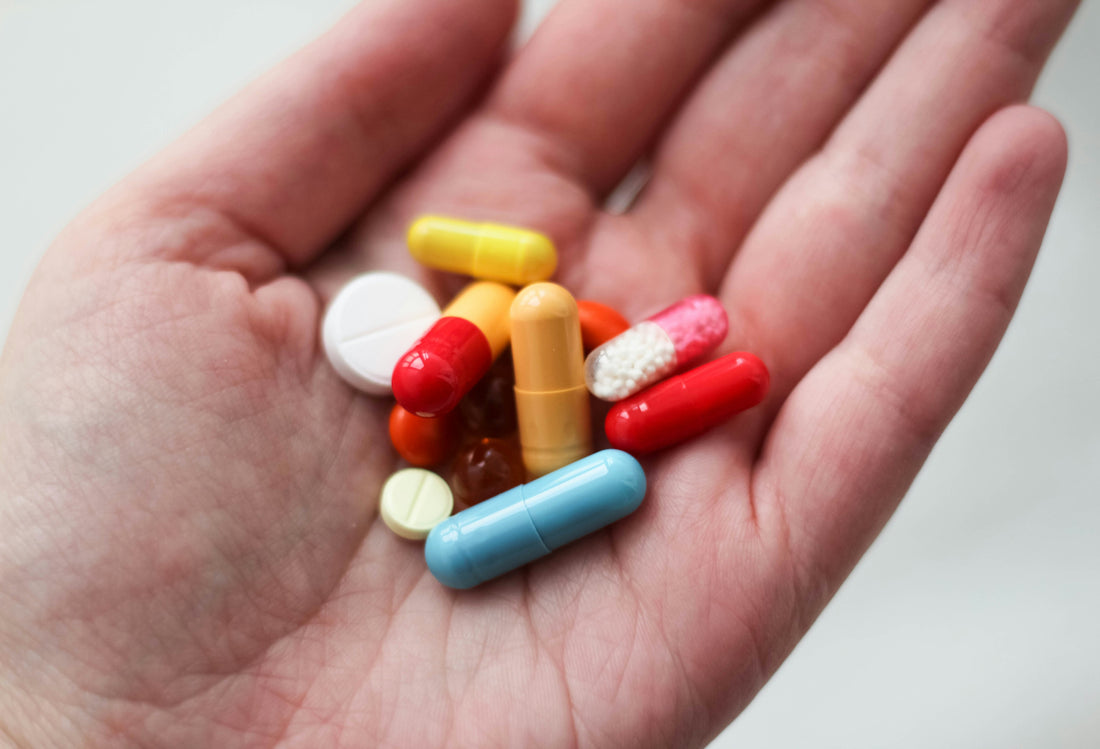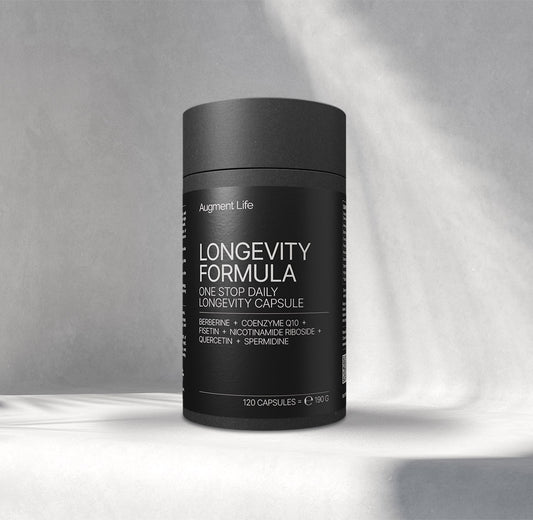Se sei un appassionato di longevità, probabilmente conosci già gli integratori di nicotinamide mononucleotide (NMN). E forse conosci anche gli integratori di trimetilglicina (TMG). Sembrerebbe che i due debbano essere assunti insieme, ma sai perché?
Non preoccuparti se non hai mai sentito parlare di questi integratori o se sei all'inizio del tuo percorso di longevità. Questo articolo ti spiegherà tutto ciò che devi sapere!
Benefici dell'NMN
L'NMN o nicotinamide mononucleotide è una molecola utilizzata come materia prima per la sintesi del nicotinamide adenina dinucleotide o NAD+. Questa molecola è poi impiegata in una vasta gamma di funzioni metaboliche e nella produzione di energia cellulare.
Con l'avanzare dell'età, la produzione naturale di NAD+ nel nostro corpo diminuisce. Cominciamo a notare i sintomi più comuni dell'invecchiamento, come la mancanza di energia, ridotte capacità atletiche e cognitive e, talvolta, lo sviluppo di malattie legate all'età. Purtroppo il NAD+ non può essere assunto direttamente dalle nostre cellule, ma l'NMN sì. Questo è il motivo per cui l'NMN è diventato un integratore anti-invecchiamento così popolare.
Diversi benefici dell'NMN per la salute sono già stati scientificamente comprovati sugli esseri umani, come:
- L'NMN aumenta i livelli di NAD+ nel sangue (1),
- L'NMN aumenta la reattività muscolare e riduce la sonnolenza in età avanzata (2),
- L'NMN migliora la capacità aerobica durante l'allenamento (3).
Leggi di più sui benefici per la salute dell'NMN nei nostri articoli:
- 5 Benefici della Nicotinamide Mononucleotide (NMN)
- A cosa serve la Nicotinamide Mononucleotide?
- Quando e come dovresti assumere l'NMN?
Devo assumere TMG con NMN?
Puoi assumere NMN senza TMG se lo desideri, oppure puoi prenderli entrambi. Tuttavia, sarebbe comunque preferibile assumere NMN e TMG insieme. Questo perché la scomposizione dell'NMN richiede alti livelli di metionina, e gli integratori di TMG potrebbero aiutare a reintegrarli (4).
Scopri la nostra offerta di integratori di TMG (Betaina): TMG (Betaina) - 500 mg x 120 capsule.
D'altra parte, se decidi di non assumere integratori di TMG, puoi provare a aumentare naturalmente i tuoi livelli di TMG o del suo precursore colina. Puoi farlo mangiando più spesso questi alimenti:
- barbabietole,
- frutti di mare,
- spinaci,
- uova (per la colina),
- fegato animale (per la colina) e carne in generale.
Nota che generalmente puoi assumere una dose di TMG/colina attraverso il cibo molto più bassa rispetto agli integratori.
Dosaggio di TMG con NMN
L'NMN è stato considerato sicuro se assunto fino a 1200 mg al giorno per un massimo di sei settimane (3). Questa dose è stata anche ritenuta più efficace rispetto a dosi minori. Il TMG è sicuro se assunto in dosi fino a 15 grammi al giorno, e i suoi effetti collaterali più comuni sono nausea, problemi gastrointestinali e livelli aumentati di colesterolo LDL nel corpo (5).
Poiché non assumerai più di 1200 mg di NMN al giorno, e il TMG supporta l'NMN, non è necessario assumere più di 1200 mg di TMG al giorno. Uno dei ricercatori più famosi nel campo della longevità, il Dr. David Sinclair, assume 1000 mg di NMN e 500-1000 mg di TMG al giorno (6).
Quando assumere TMG con NMN?
Poiché questi due integratori lavorano in sinergia, il TMG può essere assunto contemporaneamente all'NMN. Tuttavia, poiché l'idea è di aumentare i livelli di TMG nel corpo per essere disponibili per l'NMN in qualsiasi momento, puoi assumerli anche separatamente.
L'unica prova che abbiamo finora su questo argomento proviene dalla ricerca personale di David Sinclair. Egli preferisce assumere NMN e TMG, tra gli altri integratori, al mattino per avere energia sufficiente durante il giorno.
Il Dr. Sinclair sottolinea che la sua routine di integratori si basa sulla sua ricerca personale. Chiunque stia prendendo in considerazione tali integratori dovrebbe consultare un medico prima di assumerli.
Cosa non puoi assumere con l'NMN?
Gli integratori di NMN sono generalmente considerati sicuri (1), ma potrebbero esserci alcune interazioni incrociate con altri integratori o farmaci.
Un primo esempio sono gli integratori che aumentano i livelli di NAD+, ma attraverso percorsi molecolari differenti. Questi sono, ad esempio, niacina e acido nicotinico, che sono entrambe forme di vitamina B3. Pur aumentando il NAD+ tramite percorsi diversi rispetto all'NMN, potrebbero ridurre l'efficacia dell'NMN.
Studi sugli animali hanno dimostrato che l'NMN può abbassare i livelli di zucchero nel sangue e di insulina (7, 8), il che significa che potrebbe interferire con alcuni farmaci che abbassano la glicemia. Se stai già assumendo metformina o insulina, l'aggiunta di NMN potrebbe ulteriormente ridurre i livelli di zucchero nel sangue e causare ipoglicemia. Tuttavia, non esistono ricerche sugli esseri umani riguardo il rapporto tra l'NMN e i livelli di insulina, quindi consulta il tuo medico prima di assumerlo.
Riferimenti:
- Irie J, Inagaki E, Fujita M, Nakaya H, Mitsuishi M, Yamaguchi S, Yamashita K, Shigaki S, Ono T, Yukioka H, Okano H, Nabeshima YI, Imai SI, Yasui M, Tsubota K, Itoh H. Effect of oral administration of nicotinamide mononucleotide on clinical parameters and nicotinamide metabolite levels in healthy Japanese men. Endocr J. 2020 Feb 28;67(2):153-160. doi: 10.1507/endocrj.EJ19-0313.
- Kim M, Seol J, Sato T, Fukamizu Y, Sakurai T, Okura T. Effect of 12-Week Intake of Nicotinamide Mononucleotide on Sleep Quality, Fatigue, and Physical Performance in Older Japanese Adults: A Randomized, Double-Blind Placebo-Controlled Study. Nutrients. 2022 Feb 11;14(4):755. doi: 10.3390/nu14040755.
- Liao B, Zhao Y, Wang D, Zhang X, Hao X, Hu M. Nicotinamide mononucleotide supplementation enhances aerobic capacity in amateur runners: a randomized, double-blind study. J Int Soc Sports Nutr. 2021 Jul 8;18(1):54. doi: 10.1186/s12970-021-00442-4.
- Arumugam MK, Paal MC, Donohue TM Jr, Ganesan M, Osna NA, Kharbanda KK. Beneficial Effects of Betaine: A Comprehensive Review. Biology (Basel). 2021 May 22;10(6):456. doi: 10.3390/biology10060456.
- LiverTox: Clinical and Research Information on Drug-Induced Liver Injury [Internet]. Bethesda (MD): National Institute of Diabetes and Digestive and Kidney Diseases; 2012-. Betaine. [Updated 2017 Sep 26]. Available from: https://www.ncbi.nlm.nih.gov/books/NBK548774/
- Ciardha, V. (2023) The Anti-Aging Supplements Dr. David Sinclair Takes Besides NMN. NMN.com
- Yoshino J, Mills KF, Yoon MJ, Imai S. Nicotinamide mononucleotide, a key NAD(+) intermediate, treats the pathophysiology of diet- and age-induced diabetes in mice. Cell Metab. 2011 Oct 5;14(4):528-36. doi: 10.1016/j.cmet.2011.08.014.
- Mills KF, Yoshida S, Stein LR, Grozio A, Kubota S, Sasaki Y, Redpath P, Migaud ME, Apte RS, Uchida K, Yoshino J, Imai SI. Long-Term Administration of Nicotinamide Mononucleotide Mitigates Age-Associated Physiological Decline in Mice. Cell Metab. 2016 Dec 13;24(6):795-806. doi: 10.1016/j.cmet.2016.09.013.








